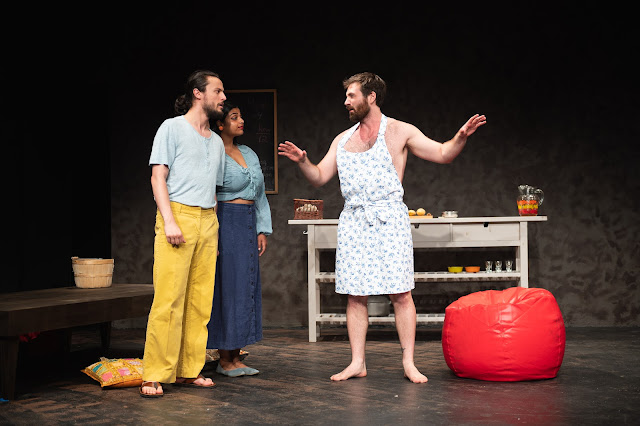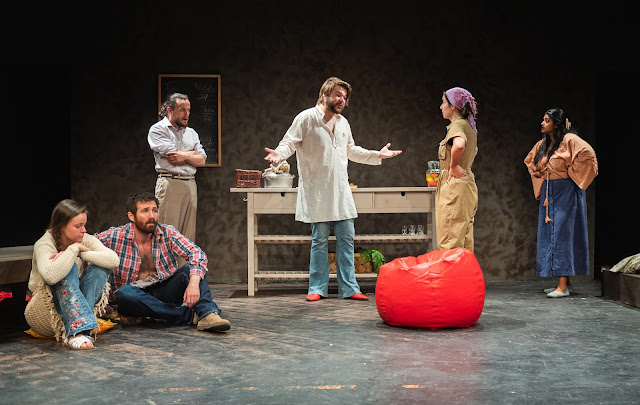Vermont
Written and directed by Rachel Carey
195 E. 3rd Street, Manhattan, NYC
July 18-30, 2023
 |
| Zachary Speigel, Sadithi De Zilva, and Rob Riordan. Photo by Valerie Terranova |
"[H]ow do you not become what you hate?" asks the character Mina (a splendid Sadithi De Zilva) deep into Rachel Carey's new play, Vermont. This question is essential not only for Mina and others at the small commune where Vermont takes place but also to the play as a whole, an absorbing comic exploration of how we define personal happiness as well as our place in and responsibility to larger communities. Vermont is the most recent live production from hybrid theater and streaming company Thirdwing. Patrons can purchase either tickets to Vermont only or a 1-year membership to Thirdwing for $49 (or $4.99/month), which includes 2 tickets to the show, 1 ticket to each upcoming production, and access to all content on its streaming platform.
Membership in Vermont's Harmonic Love Commune, in contrast, costs $50 per month–reducible by working more hours for the commune–and that's in 1972 dollars. The de facto leader of the commune, although it is not supposed to have one, is Ray (Cian Genaro), who contributes more revolutionary platitudes than labor (but also owns the property through inheritance). Natalie (Jessica Noboa), who prefers the term farm to commune and possesses the repair and maintenance skills that the others lack, also prefers clear rules and codification, which puts her into conflict with Ray, who denies that he holds outsized influence and wants to see the voting members of the commune as a family rather than a committee. The commune's baker and seasonal nudist Paul (Rob Riordan) is trying to make up for his past but beginning to think that he is not doing enough, while high school dropout turned health food enthusiast Thea (Alexandra Sumakis) feels that her life is in the best place it has ever been. Into this mix of personalities and motivations come Mina and her husband, Dan (Zachary Speigel), who knew Ray in college, where both were involved in protest activities. Mina and Dan have left behind their office jobs to spend a trial week at Harmonic Love, after which they can decide to stay–if they are voted in. Complicating this decision, the commune's members may not believe in free rides, but they do believe in free love.
 |
| L to R: Alexandra Sumakis, Rob Riordan, Zachary Speigel, Cian Genaro, Jessica Noboa, and Sadithi De Zilva. Photo by Valerie Terranova |
As the characters attempt the hard work of defining and balancing self and community, their efforts point to concerns such as whether individuals are responsible for their partner's (or partners') happiness, how alternative ways of being can end up reproducing the same oppressions as the systems which they oppose, and the trickiness of harmonizing "freedom" and communal functionality. Perhaps one of the biggest questions, and one on which Paul and Ray voice their disagreement, is whether living a particular kind of life–modeling it, in Ray's words–is sufficient or simply selfishness in the face of the need for direct action to effect change. This question seems especially pertinent for theater itself, as well as the other arts and, say, academics, but that does not mean that it does not apply just as urgently to each and every individual who cares about dismantling an unacceptable status quo.
 |
| Alexandra Sumakis and Zachary Speigel. Photo by Valerie Terranova |
The cast anchor the comedy in distinctive, authentically inhabited characters (performances well complemented by Yolanda Balana's expressive costume design). Sumakis subtly conveys the history of hurt underlying Thea's seemingly unshakeable niceness, and Noboa makes Natalie's love of procedure funny while keeping it understandable and making it clear why others at the commune look to her. De Zilva and Speigel create a couple whose love for and struggles with one another–and with their own individual paths–feel very real, as in their halting (and, again, funny, yet affecting) conversation about potentially opening their relationship. As Ray, Genaro is comfortably charismatic and confident but also, when the time comes, surprisingly vulnerable; and Riordan is simply outstanding in a layered turn as the warm-hearted Paul. Even if you think that commune life is not for you, you won't regret spending time with these characters in
Vermont.
-John R. Ziegler and Leah Richards






Comments
Post a Comment